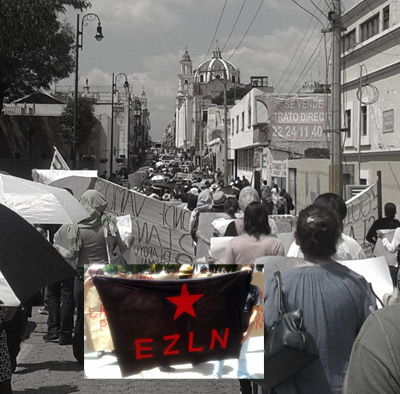Over 30 years of anarchist writing from Ireland listed under hundreds of topics
Organize your Rage! Popular Outrage shakes Mexico at Student Disappearances in Guerrero
 Protests took place in cities across Mexico yesterday following the disappearance of 43 student teachers in the southern state of Guerrero almost two weeks ago, with many of those having gone missing after the police arrested them. Thousands of people blocked streets and roads, chanting “They took them alive; we want them back alive"!
Protests took place in cities across Mexico yesterday following the disappearance of 43 student teachers in the southern state of Guerrero almost two weeks ago, with many of those having gone missing after the police arrested them. Thousands of people blocked streets and roads, chanting “They took them alive; we want them back alive"!
The students, who studied at Ayotzinapa, a radical teacher training college in Guerrero, went missing on the night of 26 September. Iguala’s municipal police fired on the students’ buses and, an hour later, unidentified gunmen fired upon them again. The attacks left three students and three others dead in the city, as well as at least 17 wounded. 43 students remain unaccounted for, a significant number of whom were seen being driven away in police vehicles after the first attack. A mass grave has since been found in a nearby location, but the charred remains have yet to be identified.
In response to public outrage, 22 municipal police officers were arrested and charged with murder. The Guerreros Unidos, the drug-trafficking group believed to be responsible for the killings and disappearances, has effectively infilitrated and local government and police authorities. The mayor of Iguala, who has been accused of cartel links, is now missing. Since the discovery of the mass graves and in response to ongoing protests, the Federal Government has taken over the investigation. People on the streets yesterday do not expect much justice from the state.
The age and innocence of those disappeared as well as the subservience of the police to the drug cartels makes these actions particularly heinous. However, state violence of this sort has systemic roots and, as such, are almost routine in Mexico. During Felipe Calderón’s presidency (2006-2012), 60,000 people were killed and 150,000 displaced as a result of drug-related violence, with 98% of all crimes going unpunished. Meanwhile, Mexico’s so-called ‘war on drugs’, fully supported by the US military-industrial complex, has allowed local police forces to militarize rapidly. This increased force is then used against social justice campaigners such as students, trade unionists and indigenous communities. In Latin America, more generally, disappearance is a common strategy of repression deployed against indigenous communities opposed to state and transnational ‘projects of death’ (various forms of natural resource extraction and associated industries that are highly destructive of local environments and communities).
In the face of such repression, the people on the streets yesterday chanted ‘you are not alone’ to the families of those disappeared; ‘we are not afraid’ to those responsible for narco-government and ‘organize your rage’ to those marching and looking on. The day of indignation included protests and street blocades in more than 20 of Mexico’s 32 states, as well as at Mexican embassies in nine other countries.
The photos here were taken by a WSM member at a demonstration held in Puebla, a city a little south of Mexico City. Some 3,000 people, predominantly students, took part.
Further Reading
http://www.mediacoop.ca/blog/dawn/31855
http://www.theguardian.com/commentisfree/2014/oct/08/us-mexico-mass-grav...

